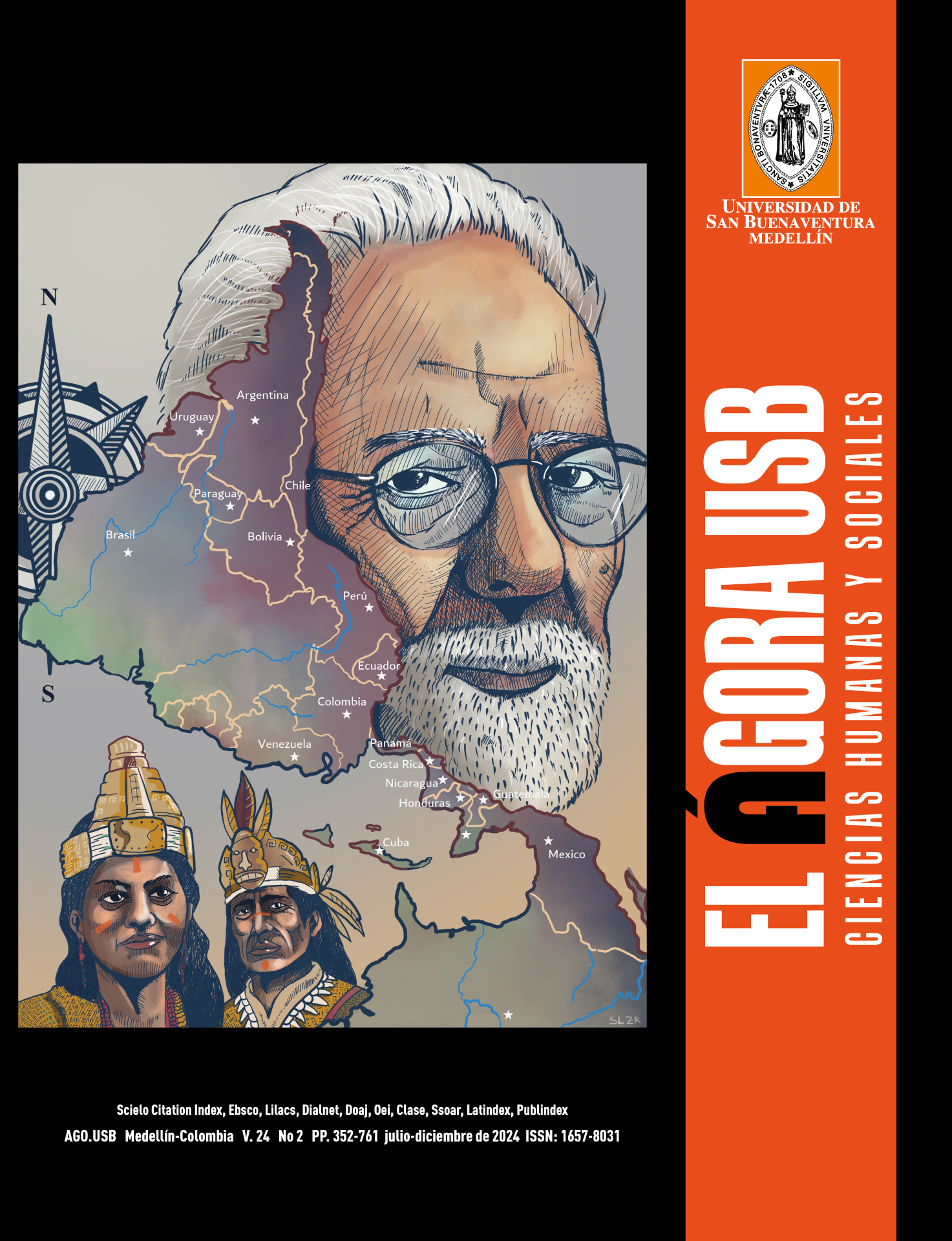The authors are also adhere to the creative commons license 4.0 (https://creativecommons.org/licenses/by-nc-nd/4.0/deed.es)
Attribution - NonCommercial - SinDerivar 4.0 International (CC BY - NC - ND 4.0)
Abstract
From the beginning, the regionalization system of the Universidad del Valle was aimed at expanding educational coverage. This study reveals an unexpected finding in this system: the unintentional configuration of spaces, which promote multi- and interdisciplinary interaction among professors. Through interviews with 17 professors appointed at regional headquarters, we analyze how this context is giving rise to emerging academic identities,
which transcend traditional disciplinary boundaries. Faculty value these spaces for dialogue positively, although institutional barriers persist, such as the low number of full-time faculty and the lack of policies, which encourage collaborative research. The physical and organizational structure of the regional headquarters currently provides, unexpectedly, the breeding ground for the development of innovative approaches in the academy. This finding suggests the need for changes in university policy in order to take advantage of these emerging opportunities, by removing barriers and fostering knowledge integration. The study highlights the transformative potential of these dynamics in knowledge production and in the shaping of new academic identities within the regionalized university system.
Keywords:
References
Barberena Nisimblat, V. (2021). Balance de la descentralización en Colombia: propuestas para el desarrollo y equidad territorial. Territorios y Regionalismos, (5), 1-12. https://doi.org/10.29393/rtr5-1BDVB10001
Brunner, J. J., & Miranda, D. A. (Eds.). (2016). Educación superior en Iberoamérica: Informe 2016. Centro Interuniversitario de Desarrollo (CINDA). https://cinda.cl/publicacion/educacion-superior-en-iberoamerica-informe-2016/
CINDA [Centro Interuniversitario de Desarrollo]. (2016). Educación Superior en Iberoamérica. Informe 2016. Balance de tendencias y cambios nacionales. Centro Interuniversitario de Desarrollo.
Clark, B. (1984). The Organizational Conception. In: Burton Clark (ed.), Perspectives on Higher Education. Eight Disciplinary and Comparative Views, (pp. 104-131). University of California Press.
DANE. (2023). Participación porcentual del PIB por departamento. https://experience.arcgis.com/experience/4bcfb30c86b443e29c051e79cf8c4738/page/Participación-porcentual-del-PIB-por-departamento/
Fonseca, J. W., & Bird, C. P. (2007). Under the radar: Branch campuses take off. University Business.
Goedereis, E. A., y MacCartney, D. (2019). Creating Common Ground: A Process to Facilitate Interdisciplinary Conversation Among University Faculty. Journal of Interdisciplinary Studies in Education, 8(2), 173 -183. https://files.eric.ed.gov/fulltext/EJ1267051.pdf
Goglio, V. & Parigi, P. (2014). An institutional mechanism to reduce internal competition? A hypothesis about the diffusion of satellite universities in Italy. Studies in Higher Education, 41(8), 1495-1513. DOI: https://doi.org/10.1080/03075079.2014.981517
Latour, B. (2005). Reassembling the Social. An Introduction to Actor-Network-Theory. Oxford University Press.
MahjoobEshratabadi, H., Malekinia, E., & Ghrone, D. (2012). Faculty and Institutional Structure: The Conflict of Interdisciplinarity. Interdisciplinary Studies in the Humanities, 4(4) 1-34. DOI: https://doi.org/10.7508/isih.2012.16.001
Mato, D. (Coord.). (2008). Diversidad cultural e interculturalidad en educación superior. Experiencias en América Latina. IESALC-UNESCO.
Ministerio de Educación Nacional [Mineducación]. (2009). Todo sobre el programa CERES. https://www.mineducacion.gov.co/1621/w3-article-187079.html
Monterroza, A. (2017). Una revisión crítica a la teoría del Actor-red para el estudio de los artefactos. Trilogía Ciencia Tecnología Sociedad. 9(17). 49-62
Nyhagen, G. M., & Baschung, L. (2013). New organisational structures and the transformation of academic work. High Education, 66, 409-423. http:// dx.doi.org/10.1007/s10734-013-9612-1
OEI [Observatorio Iberoamericano de la Ciencia, la Tecnología y la Sociedad]. (2023). Panorama de la educación superior en Iberoamérica a través de los indicadores de la red índices. Relevamiento 2022. Papeles del Observatorio #25. https://oei.int/oficinas/argentina/noticias/panorama- de-la-educacion-superior-en-iberoamerica-a-traves-de-los-indicadores- de-la-red-indices-relevamiento-2022
Pedroza Flores, R., (2006). La interdisciplinariedad en la universidad. Tiempo de Educar, 7(13), 69-98. https://www.redalyc.org/articulo.oa?id=31171304
Rama, C. (2015). Nuevas formas de regionalización de la educación superior en América Latina: la universidad red y los clúster universitarios. Revista GUAL, 8 (2), 302-328. http://dx.doi.org/10.5007/1983-4535.2015v8n 2p302
Rama, C. y Cevallos, M. (2016). Nuevas dinámicas de la regionalización universitaria en América Latina. magis. Revista Internacional de Investigación en Educación, 8(17), 99-134. DOI: https://doi.org/10.11144/Javeriana.m8- 17.ndru
Randall, G. (2016). La política de regionalización de la Universidad de la República. Un proceso para promover la interdisciplina en Uruguay. x(10), 81-108. https://doi.org/10.22201/ceiich.24485705e.2016.10.57753
Rodríguez, F. (2006). La práctica docente en el contexto de la regionalización: las sedes de la Universidad de Costa Rica. Revista Comunicación, 15(1), 79-83. https://doi.org/10.18845/rc.v15i1.1076
Rodríguez, M., & Baltodano, J. (2020). Regionalización de la educación superior en la Universidad de Costa Rica: De la democratización del acceso hacia una democratización epistémica. Revista Ensayos Pedagógicos, 16 (1), 159-187. https://doi.org/10.15359/rep.16-1.8
Salmi, J. & D’Addio, A. (2020): Policies for achieving inclusion in higher education, Policy Reviews in Higher Education. DOI: https://doi.org/10.1080/23 322969.2020.1835529
Seri, P. & Compagnucci, L. (2024). What are university satellite campuses for? A perspective on their contribution to Italian municipalities and regions. Regional Studies. DOI: https://doi.org/10.1080/00343404.2023.2299282
Tarapuez, E., Osorio, H., & Parra, R. (2012). Burton Clark y su concepción acerca de la universidad emprendedora. Tendencias, 13(2), 103-118. https:// revistas.udenar.edu.co/index.php/rtend/article/view/474
Universidad del Valle (2023). Acuerdo 011 de 2023: “Por el cual se redefinen los lineamientos estructurales y funcionales del Sistema de Regionalización, se modifica su planta de cargos y se dictan otras disposiciones”. https://drive.google.com/file/d/1lMo2Cl9ZJaGjH6mXZZq1lU6DXn- 5yKocc/view
Universidad del Valle. (2018). El proceso de consolidación de la Regionalización en la Universidad del Valle [Documento preliminar para discusión]. Oficina de Planeación y Desarrollo Institucional, Univalle.
Wirihana, L., Welch, A., Williamson, M., Christensen, M., Bakon, S. & Craft, J. (2017). The provision of higher education in regional areas: an integrative review of the literature, Journal of Higher Education Policy, and Management, DOI: https://doi.org/10.1080/1360080X.2017.1298196
Wolfe, J. & Carney, C. (2003). Academic Life at the Franchise: Faculty Culture in a Rural Two-Year Branch Campus. The Review of Higher Education, 26(3), 343-362.
Yazdani, S., Hajiahmadi, M. & Shakerian, S. (2020). Rethinking interdisciplinarity: Proposing a multilayered model. Medical Journal of the Islamic Republic of Iran, (34). doi: https://doi.org/10.34171/mjiri.34.118. PMID: 33316004; PMCID: PMC7722966.
Zaiț, A., Bratianu, C., Vătămănescu, E. M., Andrei, A. G. & Horodnic, I. A. (2021). Interdisciplinarity: A complexity approach towards academic research. Systems Research and Behavioral Science, (38), 294-306. https://doi. org/10.1002/sres.2783




















